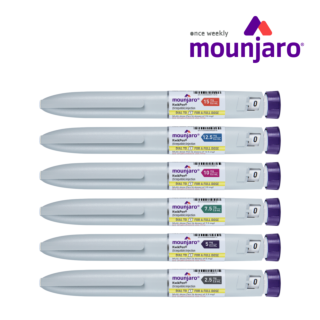What are GLP-1 receptor agonists?

Are you wondering what GLP-1 is? You might have heard the term when it comes to diabetes or weight loss. GLP-1 receptor agonists are a group of medications that are used to treat both diabetes and obesity.
Examples of GLP-1 agonists include semaglutide, liraglutide and tirzepatide. Tirzepatide is a GLP-1 and GIP receptor agonist. If you are thinking about taking a receptor agonist to help you with your weight loss journey, this guide will tell you everything you need to know about glucagon-like peptide-1 (GLP-1).
What are GLP-1 receptor agonists are used for
Also known as incretin mimetics, GLP-1 receptor agonists are used to treat type 2 diabetes. They are also used to help people with obesity lose weight. Incretin mimetics are substances that mimic hormones like glucagon-like peptide-1 (GLP-1). By binding to GLP-1 receptors, they promote insulin release in response to glucose. They also have effects on appetite and gut motility.
You will only be prescribed the medication for weight loss if you fit the criteria. Usually, your BMI needs to be 30 or above (or 27 and above for patients at risk of obesity-related illnesses) for you to be considered for the treatment. There are other factors that are taken into consideration when it comes to being prescribed the treatment.
They are available as injectable medications for weight management but are also available as tablets for patients with type 2 diabetes.
Examples of GLP-1 receptor agonists
There are different types of incretin mimetics available. They are either taken daily or weekly and include:
- Dulaglutide (weekly)
- Exenatide extended-release (weekly)
- Exenatide (twice daily)
- Semaglutide (weekly)
- Liraglutide (daily)
- Lixisenatide (daily)
- Tirzepatide (weekly)
Some common types of GLP-1 receptor agonists in the UK are Saxenda (liraglutide), Wegovy (semaglutide), and Mounjaro (tirzepatide). All are popular options for helping people to lose weight and keep it off.

How they work for diabetes patients
GLP-1 is an incretin. GLP-1 receptor agonists are synthetic compounds that mimic incretins. Incretins work by increasing insulin levels in response to rising blood sugar. The insulin reduces the amount of glucose in the blood.
As it stands, they can’t be used to treat type 1 diabetes as all research shows it to be ineffective.
Type 1 and type 2 diabetes are conditions that affect the body in different ways. When it comes to type 1 diabetes, the body is unable to make enough insulin, compared to type 2 diabetes, where the body is resistant to insulin.

How they help you lose weight
A GLP1 receptor agonist works to help you lose weight by slowing down gastric emptying. They also act on the hypothalamus, an area in the brain that can control your hunger, thus, reducing your appetite. You will feel less hungry and eat less.
What are the risks?
When you are using GLP-1 receptor agonists there are risks that you need to be aware of. You should avoid using them if you have a history of medullary thyroid cancer or multiple endocrine neoplasia. They have the potential to put you at a higher risk of thyroid cancer.
They can also put you at risk of inflammation of the pancreas (pancreatitis), kidney problems (kidney failure), severe stomach problems and gallbladder problems.
Your risk for low blood sugar (hypoglycemia) might also be higher if you are taking another medication that causes low blood sugar.
Just like any other medication, you might be at risk of experiencing a serious allergic reaction.
Common side effects
The most common side effects of GLP-1 agonists include:
- Loss of appetite
- Nausea
- Vomiting
- Diarrhoea
Other side effects can include:
- Dizziness
- Headaches
- Indigestion
The side effects caused by the medication don’t typically last long term. As your body begins to get used to the medication, the side effects should subside.

GLP-1 receptor agonists are a great way to treat both diabetes and obesity, however, they might not be the right choice for everyone.
Before you consider using them for weight loss you should look at the risks so you are able to make an informed decision. If you think that GLP-1 receptor agonists may be the right match for you then reach out to your healthcare provider and they can talk you through your options.







